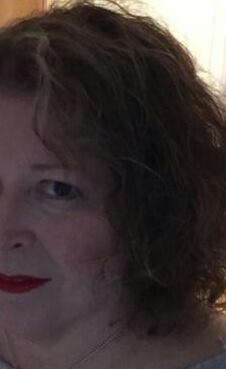by Carol Cassara
She was a writer. They all were — journalists, novelists, corporate writers, poets, playwrights, and pamphlet writers. The entire family loved the written word, producing it, reading it, talking about it.

I fell in love with their son first, and then with all of them. They embraced me as family and we were all pleased that, when I married their son, I’d have official family status.
When I had married for the first time, as a young Sicilian-American woman, my then-husband and I were integrated instantly into each other’s families and called both sets of parents Mom and Dad. But by the time I got engaged this time around and met his family, I was too many marriages and in-laws down the road to call her Mom, though we grew so close, I might as well have.
I loved her.
Words weren’t my own mother’s thing — numbers were. She had quit banking to raise a family and when she was alive our conversations revolved around our family’s latest crisis, our vacations, and the mundane minutia of everyday life.
But this? This was different. His mother and I could talk about plot and words. Books and craft. Turning life into theatre. Creativity.
Together, we strolled purposefully through art galleries and museums. Like me, she knew what she liked and could move quickly past what she didn’t. Our comments were brief, a few pointed words or a “what do you think of that?” Then, lunch and more talk about books or plays or movies. Once, we even talked about our first loves, in ways a potential mother-and-daughter-in-law usually don’t, but writers can.
Letta didn’t look girly, but secretly she was. Her vibe was casual, but dressed up in suit and boots, blunt-cut grey hair, glasses on her nose. She was every inch the playwright.
We liked off-beat, heady movies, the kind her husband and son, both poets, didn’t enjoy, like Rabbit Hole, and I’d sometimes take the ninety-minute train ride up to San Francisco just to see a matinee with her.
At bookstores we’d split up and browse, every so often seeking the other out, an interesting book in hand, asking, “Have you read this?” I’d always follow her recommendations.
This is the family I should have been born into, I thought.
Everything in Letta’s life was fodder for her plays, and sometimes, sitting in the audience I recognized dialogue and family situations that had really happened. Marriages that had ended. Sibling relationships. Her son’s marriage proposal to me.
She could be indirect, sly, even manipulative, and not just in her writing. She had a tweaked sort of mother-energy, different but familiar. Since she hadn’t raised me and our relationship wasn’t fraught with history, her motherly manipulations made me laugh. And then, one day, four years after we’d met, it was clear that her son and I weren’t going to get married. That I’d have to give him up.
The thought of giving her up, too, was too much to bear.
In my life before then, deaths both literal and figurative had taken husbands, lovers, family. There were only so many loves I could face leaving behind and hers was not among them.
We managed to remain friends, still spending time together. We never really discussed it; we just continued to see each other. Some of her family didn’t approve, thinking our continuing contact, and how much we both seemed to enjoy the connection, made her son feel bad.
She asked him if he minded. He gave his blessing.
Several years passed. She got me involved with a theatre group she co-founded. I remarried. She met and liked my new husband. My friends met and liked her. People who had just been names in conversations became faces, too, and personalities. Our relationship grew even stronger.
Then one day, both of us leaning against the wall in the sunshine outside a small theater in San Francisco where we’d just seen a play, she asked, apropos of nothing, “Do you love me just because of my son?” Her tone was plaintive and maybe a little uncertain, but her meaning hit me like a punch to my solar plexus.
“Oh my God, no! Do you really think that?” I was shocked to the core.
She shook her head. “No. No.” She quickly demurred. “We have a really special relationship.”
On the train home that evening her question was all I could think about. Did she really think that my love for her was all about her son? Had she always thought that way?
Houses along the train track rushed by in a blur and my Kindle lay idle on my lap.
Then I had another thought, this one more disturbing. Could she be right? What was our friendship really all about? Why did I love her?
And then, improbably, I heard a Paul Simon song play in my head and I knew.
The moment I got home I began to write. Cut, paste, and inserted it into an e-mail addressed to her.
Into the subject line I typed: Fifty Ways I Love His Mother.
SEND.
The next morning, a reply.
“Thank you.”
Later, she told me she’d printed it out, read it and re-read it.
I was relieved. She was almost twenty-five years older than I. One day, in all probability, I’d survive her.
But right now? I wasn’t ready to give her up.
Even if, one day, I see a play she’s written in which an older woman asks someone like me, “Is my son the reason you love me?”
Because, I realized later, it was entirely possible and even plausible that she’d asked the question to generate dialogue she might later use.
Like I said, sly. Number forty-nine of the fifty ways I love his mother.

Carol A. Cassara is a writer whose essays have appeared in Skirt!, the Christian Science Monitor, Blood and Thunder literary magazine, the San Francisco Chronicle, on KQED public radio, several Chicken Soup for the Soul books and other publications and anthologies. When she’s not at the keyboard, she’s traveling the world with her awesome husband or playing with her adorable, but bratty, maltipoo. She blogs daily on creating our best lives at www.carolcassara.com
Carol, I so enjoy this piece. Generational interaction in our society has become difficult with the change in how we construct community. It is way too easy to exclude entire groups from whom we could find friends, enrichment, and wisdom.
Beautiful and such a lovely, candid story. So glad you shared it with us. Wonderful.
What a wonderful tribute. Sometimes we meet people (like her son) because we are meant to meet and connect with someone else. (his mother) It was meant to be. She sounds like a fascinating person.
Hi Carol lovely to meet you through Midlife Megaphone FB page. How wonderful your relationship sounds with your mother-in-law. Many would be envious and I can feel through your writing how much she means to you. Enjoy your times together and have a lovely day. Sue from Sizzling Towards Sixty
That was a fantastic read – and a wonderful woman to have as a friend and a role model for how older women can be so vibrant and interesting still x
I did not know it would be possible but I loved piece even more this time I read it!
What a lovely story and a lovely relationship. You are lucky to have found such a friendship that lasted through your marriage. Fifty ways I love his mother. Priceless.
What a beautiful tribute to a very special – and rare – relationship. You are so lucky to have each other.
As I read this, I thought “How lovely to share such friendship and intimacy with another.” She was certainly making herself vulnerable in asking yourself that question. Thanks for letting us in on this very special relationship.
Oh how I love meeting and learning from fascinating smart women. This is a nourishing story about rare heartfelt connections that are rare. These special, mentoring relationships between women are important. Sometimes we meet a man only to go around them to the woman you were really supposed to connect with, I feel like I know you, thank you!